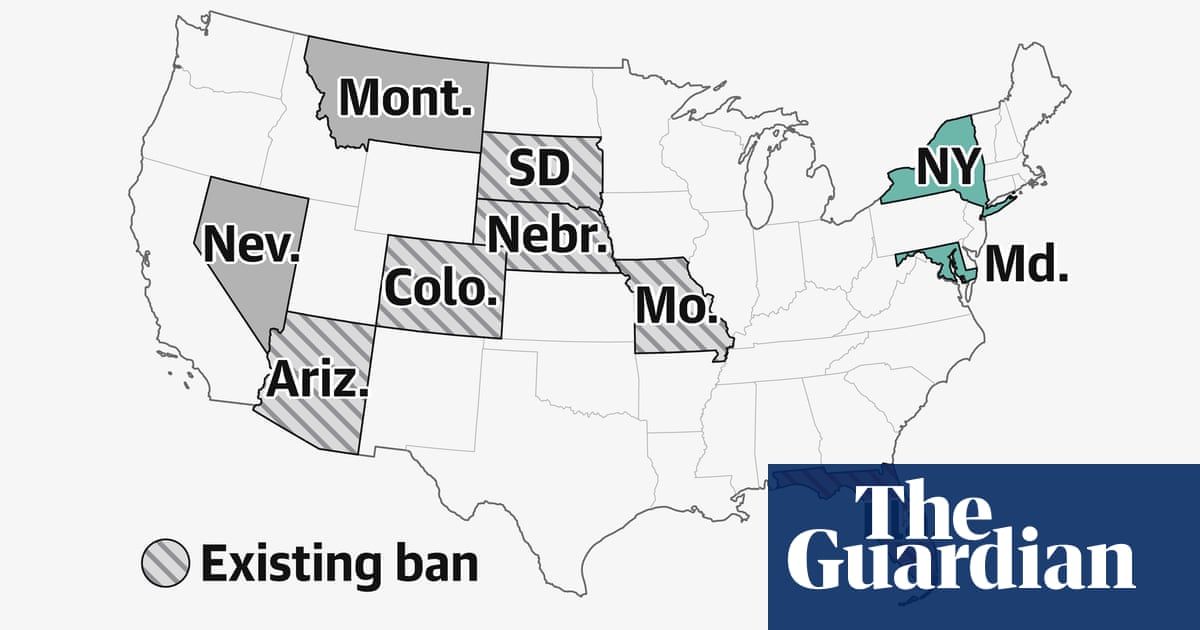Americans in 10 US states voted on Tuesday on whether to enshrine the right to abortion into their state constitutions.
In Florida, an effort to roll back a six-week ban fell short, but New York and Maryland both passed measures to amend their state constitutions to protect abortion rights and cement the blue states’ status as abortion havens. Other states, such as Missouri and Arizona, still offer additional opportunities to overturn bans that state legislatures passed after the US supreme court overturned Roe v Wade in June 2022, doing away with the federal right to an abortion.
Elsewhere, Americans voted on whether to boost protections for the procedure and make them harder to roll back in the event that conservatives take power. And in one state – Nebraska – two competing measures asked voters to choose between enshrining an existing 12-week ban or replacing it with more expansive abortion protections.
Before Tuesday, seven states had held abortion-related ballot referendums, and abortion rights supporters won all of them before Florida broke their streak. The results of Tuesday’s measure will not be the final word; states that vote to overturn bans will see litigation or legislation before those bans are repealed. But taken together, the results will indicate how potent the issue remains after two years without Roe.
Results began rolling in with the announcement from Florida, but it could take days for a complete tally of all of the votes.
Arizona
Abortion rights supporters in Arizona, a key battleground state in the presidential election, are vying to pass a measure that would enshrine the right to abortion until fetal viability, or about 24 weeks, in the state constitution. Abortion is currently banned in the state after 15 weeks.
Colorado
Colorado’s measure, which needs to garner 55% of the vote, would amend the state constitution to block the state government from denying, impeding or discriminating against individuals’ “right to abortion”. There is currently no gestational limit on the right to abortion in the state.
Florida voters rejected a measure to roll back the state’s six-week ban by adding the right to an abortion up until viability to the state’s constitution. It needed 60% of the vote to pass, the highest threshold of any of the ballots.
Maryland
Voters in Maryland approved a measure to amend the state constitution to confirm individuals’ “right to reproductive freedom, including but not limited to the ability to make and effectuate decisions to prevent, continue, or end the individual’s pregnancy”. There is currently no gestational limit on the right to abortion in the state.
Missouri
Voters will decide whether to overturn the state’s current, near-total abortion ban and establish a constitutional guarantee to the “fundamental right to reproductive freedom”, including abortion care until fetal viability.
Montana
Abortion in Montana is currently legal. If passed, the measure would amend the state constitution to explicitly include “a right to make and carry out decisions about one’s own pregnancy, including the right to abortion” up until fetal viability, or after viability to protect a patient’s life or health.
Nebraska
Nebraska is the lone state with two competing ballot measures. If both measures pass, the measure that garners the most votes would take effect.
The first would enshrine the right to abortion up until viability into the state constitution.
The second would enshrine the current 12-week ban.
Nevada
Nevada’s measure would amend the state constitution to protect the right to abortion up until viability, or after viability in cases where a patient’s health or life may be threatened.
New York
New York voters approved a measure to broaden the state’s anti-discrimination laws by adding, among other things, protections against discrimination on the basis of “sex, including sexual orientation, gender identity, gender expression, pregnancy, pregnancy outcomes, and reproductive health”. It does not explicitly reference abortion, but advocates say its pregnancy-related language encompasses abortion protections. Abortion is protected in New York until fetal viability.
South Dakota
South Dakota’s measure is less sweeping than other abortion rights measures, because it would only protect the right to abortion in the first trimester of pregnancy. Although this measure will appear on the ballot, there will be a trial over the validity of the signatures that were collected for it. Depending out the outcome of the trial, the measure – and any votes cast for it – could be invalidated.












